
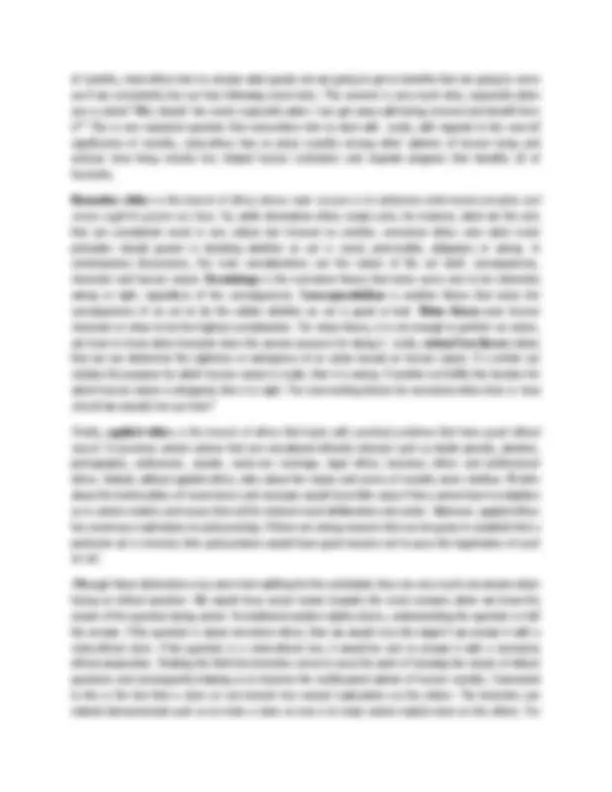
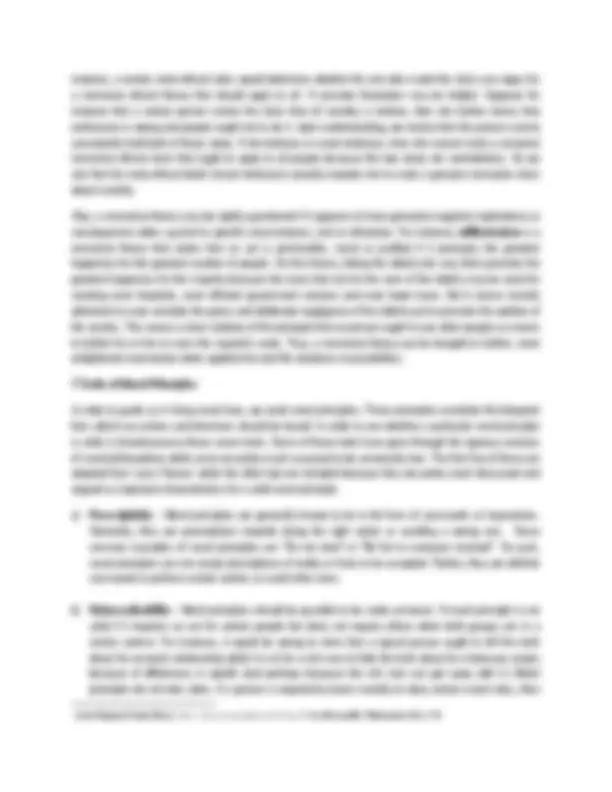
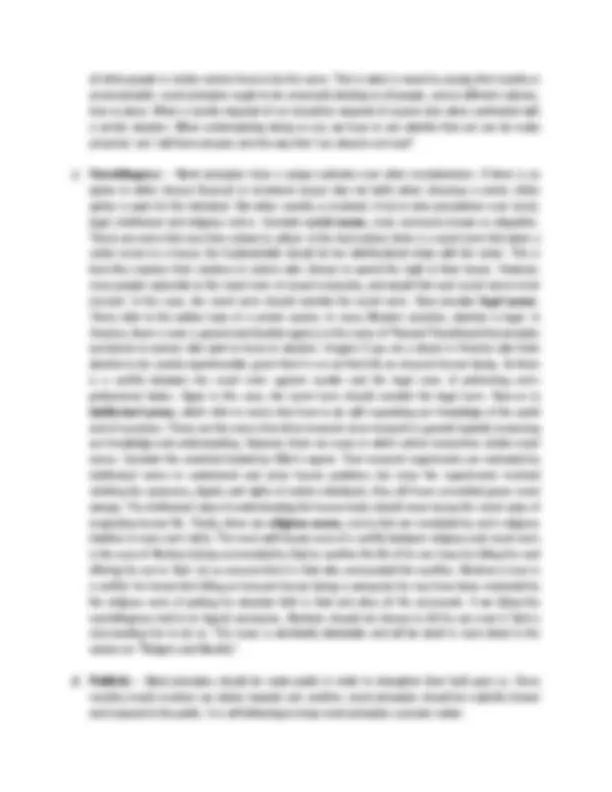
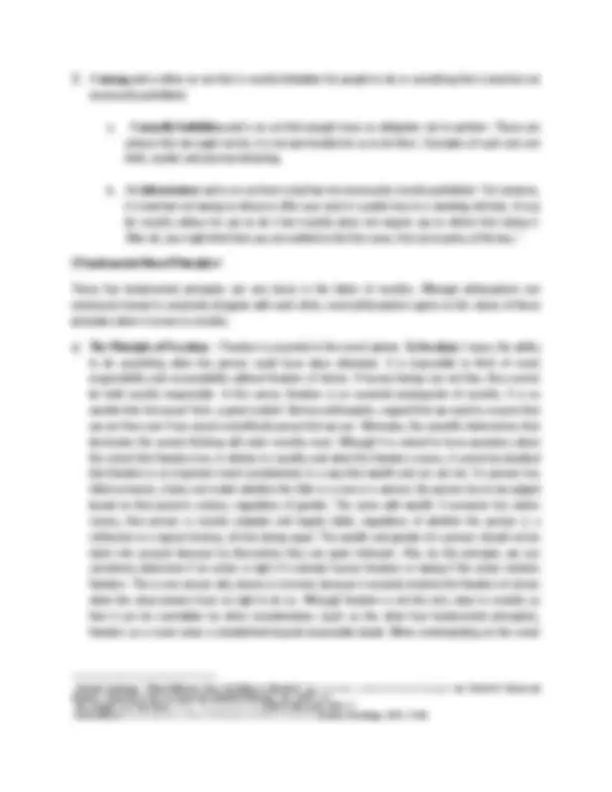
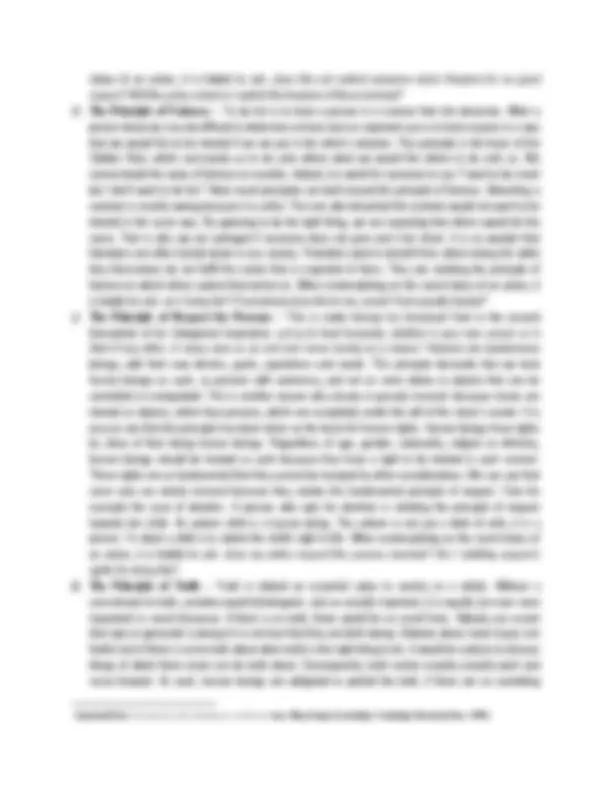
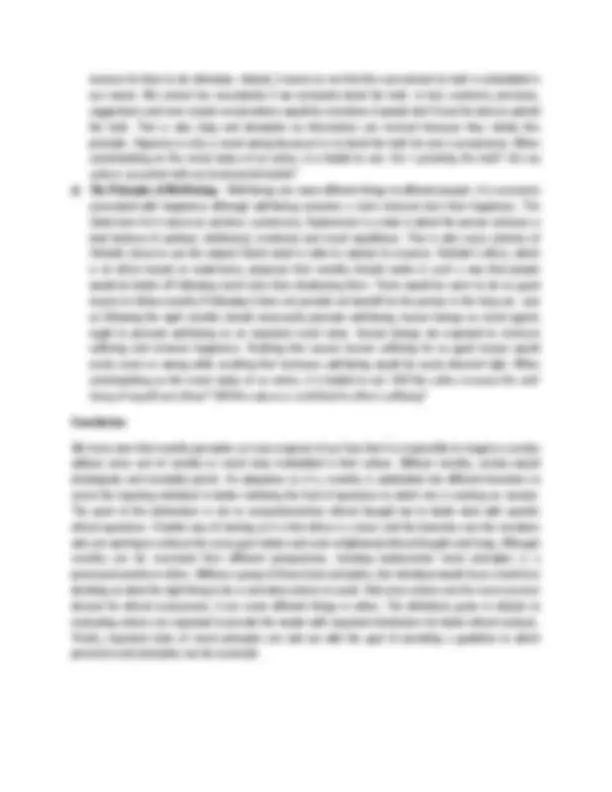


Study with the several resources on Docsity

Earn points by helping other students or get them with a premium plan


Prepare for your exams
Study with the several resources on Docsity

Earn points to download
Earn points by helping other students or get them with a premium plan
Community
Ask the community for help and clear up your study doubts
Discover the best universities in your country according to Docsity users
Free resources
Download our free guides on studying techniques, anxiety management strategies, and thesis advice from Docsity tutors
Background of ethics mnakaisbcsU DWNZJSg aSFHVHSBD LhxsDDSH
Typology: Lecture notes
1 / 10

This page cannot be seen from the preview
Don't miss anything!







Ethics: A Background Morality is a powerful and pervading force in human life. A cursory glance at the news would show the following: Some politicians were caught having a mistress or trapped in a corruption controversy from which there seems to be no escape. A presidential candidate vowing to optimally minimize crime in the country by killing heinous criminals like kidnappers, drug lords and rapists. While swimming in a known falls, a typical teenager saved the life of a friend in grave danger of drowning while sacrificing his life in return. A man turned himself to the police because he was part of a horrifying crime involving a woman. What brought him to confess? His conscience. What are these examples telling us? They tell us that morality as practiced or violated is everywhere. The first example tells us that having a mistress or being a part of a corruption scheme are moral wrongs. These politicians may have violated our nation’s laws that led to their being jailed but their actions are abhorrent in other sense. What they did violate are our moral sensibilities regarding what we ought to do or not do in all circumstances. We know that we ought to honor our contracts, marriage or otherwise, and we know that we ought not to steal even if there is a low or even zero probability of being caught. The second example prompts us to question whether doing something evil, which is killing in this case, in order to prevent further more damaging evils may be justified in certain circumstances. Is it the case that the end justifies the means in this particular scenario? The third example brings us into a highly admirable yet heart-wrenching story of a moral heroism that is of the highest degree: to sacrifice one’s life to save another. The last one engages our moral nature by invoking the great force of moral conscience in making us applaud or regret our actions. All these examples raise many questions regarding human morality: what are things that we ought to do or not do in all circumstances? Would a commonly considered immoral act be justified in order to produce a greater good? What are our moral obligations towards other people? What are the roots of our moral conscience? Is it right to view conscience as the voice of God? Indeed, these practically-oriented moral questions are connected to questions about our general idea of morality: what is right and wrong? Are there any actions that are inherently good or bad? What make them so? Is morality binding to all people in all circumstances or is it simply a matter of culture that varies depending on your point of view? These are some of the universally important questions that we will deal on this book. Indeed, as important morality is to our society, nation and human civilization as a whole, it is equally necessary to ask questions that critically examine our most fundamental assumptions about the moral life, moral laws and moral principles. We all want to know how to live a good life just as Socrates and the other ancient philosophers have asked and wrested about it. Indeed if possible, what we want is to live the best life that is in accordance with, not in opposition to the true and universally binding morality.
Ethics and Its Branches Before we define ethics, let us look first at the definition and scope of morality. Morality is the sphere of human life that is concerned with right and wrong, good acts as opposed to bad acts, and universally accepted principles and laws as to how to live with others. On the other hand, ethics is the branch of philosophy that deals with questions of morality. Morality then is the object of study while ethics is the field of study itself. Since morality is such a wide and multilayered phenomenon, ethics has been divided into different branches of study. Descriptive ethics is concerned with the actual morality that people have practiced and upheld throughout history. It answers the following related questions: what are the moral laws and principles that people actually came up with and practiced? What do certain cultures actually believe about morality? Are there any universal moral notions that cut across culture, time and place? In the field of sociology and anthropology, descriptive ethics is about what societies and cultures have believed about morality and how they practiced these moral principles and laws that they believe. In the field of psychology, descriptive ethics is about how people developed their moral sense and what factors are involved in their moral development. Also, moral psychology is concerned with how people actually behave in accordance with or as opposed to certain moral laws and principles and more importantly, knowing the psychological factors that lead to certain moral or immoral behaviors. These are important tasks which will be the concern of our chapter on science and morality. By now, it is clear that descriptive ethics is a field for social scientists, not philosophers. Descriptive ethics is concerned with what people actually believe and how do people actually behave and think with regards to morality and not how people ought to behave. Those concerned with descriptive ethics go out, survey different cultures, calculate statistical data and understand different notions of morality, as opposed to the nature of the study of philosophical ethics that is primarily concerned with the concepts of right and wrong and other moral concepts, all of which can be generally studied without leaving the home or the library. This does not mean that one field is more superior to the other or that one field cannot learn or enlighten the other. Each field has different objects of knowledge and both can provide genuine insights into morality. Indeed, some discoveries regarding different cultures’ take on morality led some anthropologists to claim that all morality is relative, which is a meta-ethical not a descriptive, claim. Although their claim will be questioned on the chapter on moral relativism, this only serves to show that an empirical study on ethics can enlighten moral deliberation about the meaning and nature of right and wrong. Meta-ethics is the branch of ethics that deals with nature, origin, meaning, value and over-all significance of morality. With regards to the nature of morality, the on-going debate is whether morality is relative or objective. This will be the focus of chapters 2 and 3. Meta-ethics also deals with the question of where morality originate, if it has any origins at all. This will be answered on chapter 4. On the meaning of morality, the main question is: what do we mean when we say that an act is good or bad? Are we speaking of an objective fact that holds whether we believe it or not, or we are simply expressing our distaste or admiration for certain actions, much as we dislike some foods and love others? As with regards to the value
instance, a certain meta-ethical claim would determine whether the one who made the claim can argue for a normative ethical theory that should apply to all. A concrete illustration may be helpful. Suppose for instance that a certain person makes the claim that all morality is relative, then she further claims that euthanasia is wrong and people ought not to do it. Upon understanding, we realize that this person cannot consistently hold both of those views. If she believes in moral relativism, then she cannot make a universal normative ethical claim that ought to apply to all people because the two views are contradictory. So we see that her meta-ethical belief (moral relativism) actually impedes her to make a genuine normative claim about morality. Also, a normative theory may be rightly questioned if it appears to have genuinely negative implications or consequences when applied to specific circumstances, real or otherwise. For instance, utilitarianism is a normative theory that states that an act is permissible, moral or justified if it promotes the greatest happiness for the greatest number of people. On this theory, letting the elderly die may likely promote the greatest happiness for the majority because the taxes that are for the care of the elderly may be used for creating more hospitals, more efficient government services and even lower taxes. But it seems morally abhorrent to even consider the gross and deliberate negligence of the elderly just to promote the welfare of the society. This seems a clear violation of the principle that no person ought to use other people as means to further his or her or even the majority’s ends. Thus, a normative theory can be brought to further, more enlightened examination when applied into real-life situations or possibilities. 7 Traits of Moral Principles In order to guide us in living moral lives, we need moral principles. These principles constitute the blueprint from which our actions and decisions should be based. In order to see whether a particular moral principle is valid, it should possess these seven traits. Some of these traits have gone through the rigorous analysis of moral philosophers while some are pretty much assumed to be universally true. The first five of these are adopted from Louis Pojman^1 while the other two are included because they are pretty much discussed and argued as important characteristics for a valid moral principle. a) Prescriptivity – Moral principles are generally known to be in the form of commands or imperatives. Generally, they are prescriptions towards doing the right action or avoiding a wrong one. Some common examples of moral principles are “Do not steal” or “Be fair to everyone involved”. As such, moral principles are not simply descriptions of reality or facts to be accepted. Rather, they are definite commands to perform certain actions or avoid other ones. b) Universalizability – Moral principles should be possible to be made universal. A moral principle is not valid if it requires an act for certain people but does not require others when both groups are in a similar context. For instance, it would be wrong to claim that a typical person ought to tell the truth about his romantic relationship while it is ok for a rich man to hide the truth about his mistresses simply because of differences in wealth (and perhaps because the rich man can get away with it.) Moral principles do not take sides. If a person is required by basic morality to obey certain moral rules, then (^1) Louis Pojman & James Fieser, Ethics: Discovering Right and Wrong, 7 th (^) ed. (Boston MA: Wadsworth, 2012), 7-8.
all other people in similar context have to do the same. That is what is meant by saying that morality is universalizable: moral principles ought to be universally binding to all people, across different cultures, time or place. What is morally required of me should be required of anyone else when confronted with a similar situation. When contemplating doing an act, we have to ask whether that act can be made universal: can I will that everyone acts the way that I am about to act now? c) Overridingness – Moral principles have a unique authority over other considerations. If there is an option to either choose financial or emotional reason (but not both) when choosing a career, either option is open for the individual. But when morality is involved, it has to take precedence over social, legal, intellectual and religious norms. Consider social norms , more commonly known as etiquettes. These are norms that vary from culture to culture. In the Inuit culture, there is a social norm that when a visitor comes to a house, the husband/wife should let her wife/husband sleep with the visitor. This is how they express their courtesy to visitors who choose to spend the night at their house. However, many people subscribe to the moral norm of sexual exclusivity, and would find such social norms to be immoral. In this case, the moral norm should override the social norm. Now consider legal norms. These refer to the written laws of a certain society. In many Western societies, abortion is legal. In America, there is even a government-funded agency in the name of Planned Parenthood that provides assistance to women who want to have an abortion. Imagine if you are a doctor in America who finds abortion to be morally reprehensible, given that it is an act that kills an innocent human being. So there is a conflict between the moral norm against murder and the legal norm of performing one’s professional duties. Again in this case, the moral norm should override the legal norm. Now on to intellectual norms , which refer to norms that have to do with expanding our knowledge of the world and of ourselves. These are the norms that drive research since research is geared towards increasing our knowledge and understanding. However, there are cases in which certain researches violate moral norms. Consider the scientists funded by Hitler’s regime. Their research experiments are motivated by intellectual norms to understand and solve human problems but since the experiments involved violating the autonomy, dignity and rights of certain individuals, they still have committed grave moral wrongs. The intellectual value of understanding the human body should never trump the moral value of respecting human life. Finally, there are religious norms , norms that are mandated by one’s religious tradition or even one’s deity. The most well-known case of a conflict between religious and moral norm is the case of Abraham being commanded by God to sacrifice the life of his son Isaac by killing him and offering his son to God. Let us assume that it is God who commanded the sacrifice. Abraham is torn in a conflict: he knows that killing an innocent human being is wrong but he may have been motivated by the religious norm of putting his absolute faith in God and obey all His commands. If we follow the overridingness trait to its logical conclusion, Abraham should not choose to kill his son even if God is commanding him to do so. This issue is admittedly debatable and will be dealt in more detail in the section on “Religion and Morality”. d) Publicity – Moral principles should be made public in order to strengthen their hold upon us. Since morality mostly involves our duties towards one another, moral principles should be explicitly known and imposed to the public. It is self-defeating to keep moral principles a private matter.
circumstances. The law equally applies to everyone as long as they satisfy the conditions that these people fulfill. Evaluating Actions When we are faced with a morally significant situation, we often turn to the nature of the action and decide whether the action done is right or wrong. Although these two categories are common in moral discourse, they can mean different things and can be categorized in several ways. Before we go to these details, it is important to mention morally neutral actions. These are acts that are permissible one way or another. For instance, choosing whether to use a black or a blue pen is a morally neutral act. Any of these two options are morally neutral since none of them is morally required and the choice would have no morally significant implications. Now that we’ve set that definition straight, let us move forward to the categories of right and wrong actions:
reasons for them to do otherwise. Indeed, it seems to me that this commitment to truth is embedded in our nature. We cannot live consistently if we constantly bend the truth. In fact, contracts, promises, suggestions and even simple conversations would be senseless if people don’t have the duty to uphold the truth. That is why lying and deception by themselves are immoral because they violate this principle. Hypocrisy is also a moral wrong because it is to bend the truth for one’s convenience. When contemplating on the moral status of an action, it is helpful to ask: Am I upholding the truth? Are my actions consistent with my fundamental beliefs? e) The Principle of Well-being – Well-being can mean different things to different people. It is commonly associated with happiness although well-being connotes a more inclusive term than happiness. The Greek term for it seems to suit best: eudaimonia. Eudaimonia is a state in which the person achieves a total balance of spiritual, intellectual, emotional and moral equilibrium. That is why many scholars of Aristotle chose to use the original Greek word in order to capture its essence. Aristotle’s ethics, which is an ethics based on eudemonia, proposes that morality should matter in such a way that people would be better off following moral rules than disobeying them. There would be seem to be no good reason to follow morality if following it does not provide net benefit for the person in the long run. Just as following the right morality should necessarily promote well-being, human beings as moral agents ought to promote well-being as an important moral value. Human beings are expected to minimize suffering and increase happiness. Anything that causes human suffering for no good reason would easily count as wrong while anything that increases well-being would be easily deemed right. When contemplating on the moral status of an action, it is helpful to ask: Will this action increase the well- being of myself and others? Will this reduce or contribute to other’s suffering? Conclusion We have seen that morality pervades so many aspects of our lives that it is impossible to imagine a society without some sort of morality or moral rules embedded in their culture. Without morality, society would disintegrate and inevitably perish. As ubiquitous as it is, morality is subdivided into different branches to assist the inquiring individual in better clarifying the kind of questions to which she is seeking an answer. The point of this delineation is not to compartmentalize ethical thought but to better deal with specific ethical questions. A better way of looking at it is that ethics is a team and the branches are the members who are working to achieve the same goal: better and more enlightened ethical thought and living. Although morality can be examined from different perspectives, knowing fundamental moral principles is a paramount priority in ethics. Without a grasp of these basic principles, the individual would have a hard time deciding on what the right thing to do is and what actions to avoid. And since actions are the most common domain for ethical assessment, it can mean different things in ethics. The definitions given in relation to evaluating actions are expected to provide the reader with important distinctions for better ethical analysis. Finally, important traits of moral principles are laid out with the goal of providing a guideline to which personal moral principles can be assessed.